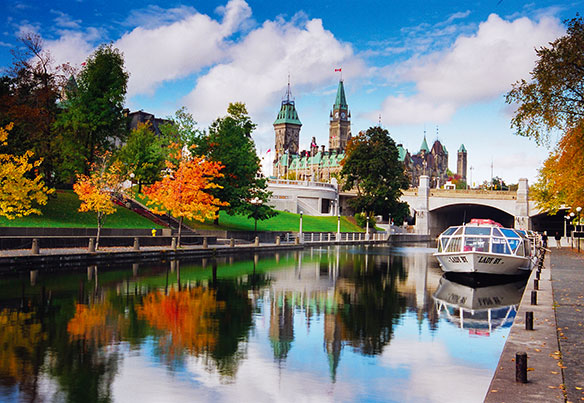Without A Plan, Industry Is At Risk

Canada’s travel and tourism industry continues to put pressure on the federal government to provide the sector with a comprehensive, national plan to reopen the economy, ensure the free movement of Canadians across the border and implement a clear vaccination certification program that allows entry to international travellers.
That message was delivered loud and clear in Ottawa yesterday (June 14) by representatives of the Canadian Travel & Tourism Roundtable that included: Perrin Beatty, President and CEO of the Canadian Chamber of Commerce; Beth Potter, President & CEO of the Tourism Industry Association of Canada; Susie Grynol, President and CEO of the Hotel Association of Canada; Daniel-Robert Gooch, President of the Canadian Airports Council; and Mike McNaney, President and CEO of the National Airlines Council of Canada.
The Canadian Chamber of Commerce’s Beatty said that: “It is imperative that we have logical, clear measures in place to facilitate travel within Canada and internationally. A piecemeal approach to policy announcements on travel will only raise more questions and create confusion.”
The group noted that although the federal government received advice from the COVID-19 Testing and Screening Expert Advisory Panel at the end of April, it has yet to publish a comprehensive reopening plan for international and domestic travel — particularly a plan around the admission of fully vaccinated foreign nationals into Canada.
The industry group also pointed to the communique coming out of this past weekend’s (June 11-13) G7 Summit recognizing “the importance to the global economy of safely restarting international travel, by land, air and sea, and multilateral efforts to achieve this,” as well as stressing the need for “a set of common standards for travel including interoperability and mutual recognition of digital applications, testing requirements, recognition of vaccination status including exemptions and comparable criteria for when responsive measures may be required.”

And it noted that while international discussions are important, Canada remains a clear outlier among its G7 peers, having yet to announce a comprehensive reopening plan.
In fact, the president and CEO of the Hotel Association of Canada, Susie Grynol made it clear that: “Canada cannot afford to be left behind as other countries around the world begin to reopen.”
Said Grynol: “Without a clear plan in place, our vibrant tourism industry is at risk and people’s livelihoods are in jeopardy. Fully vaccinated travellers should be afforded the same opportunities, regardless of their nationalities.”
The CCC’s Beatty agreed, observing that Canada is well behind other countries in this respect and pointing out that “when it comes to first shots, Canada is a world leader, but we’re a laggard in terms of planning to restart.”
Beatty said that Canada is behind Europe, the US and a number of other countries in terms of having a reopening plan and noted that by all accounts the US will have “a very robust tourism season” this summer and “we need to have that in Canada.”
With vaccination levels rising in both countries, the leaders of the Canadian Travel & Tourism Roundtable said the federal government needs to put in place “an evidence-based plan” to reopen the Canada-US border which has been closed to non-essential travel since March 2020.
The Roundtable leaders argue that Canadians deserve a single national policy approach to travel that clarifies the country’s policy on vaccination certification, the international border, unvaccinated minors, and other critical details that require national leadership.
In the absence of a nation-wide plan, the Roundtable said that the country’s tourism industry is seeing a patchwork of policies roll out provincially that are difficult to reconcile.

The federal government’s announcement that it intends to remove the mandatory hotel quarantine requirement for fully vaccinated Canadians and reduce quarantine upon the results of an arrivals test, is a ‘step in the right direction,’ according to The Roundtable, but it also states that “more policy changes are needed to support the travel and tourism sector recovery.”
Beth Potter, president & CEO of TIAC, observed: “The Canadian travel and tourism industry – and the Canada-U.S. border – has been effectively closed since March 2020. A holistic Canada-wide plan is needed to provide certainty to businesses and Canadians. We are seeing provinces fill in the gaps that have been created by the absence of a federal reopening plan and this will create confusion for travellers.”
With Canadians doing their part and getting vaccinated, the Roundtable says that now it is time for the federal government to provide clear, timely, and safe guidance on reopening Canada for travel.
Canadian Airports Council’s Daniel-Robert Gooch points out that: “There is significant demand across Canada for travel. We urgently need the federal government to lay out a plan so that Canadians, and those seeking to safely travel to Canada, are not left behind. Other countries have done this. Our sector depends on this. Canadians are expecting this.”
Recent announcements have shown some progress but much more clarity is needed, the Roundtable states, arguing that Canada’s policies should be rooted in science, which justifies a renewed approach to border measures, ongoing testing requirements, and quarantine restrictions for partially vaccinated Canadians and fully vaccinated foreign nationals.
And it makes it clear that there is no science-based reason to further delay the implementation of the government’s own Expert Panel recommendations.
The National Airlines Council of Canada’s Mike McNaney says that: “We have tens of thousands of employees that are relying on government to release a plan,” and continues: “Countries that successfully implement a science and data–based testing and quarantine policy will not only protect public health, they will drive their overall domestic recovery and take jobs and investment from countries that do not.”
While the federal government has been promising that a plan is coming soon, TIAC’s Potter probably sums things up best for the industry, saying that “the time for soon is now.”


